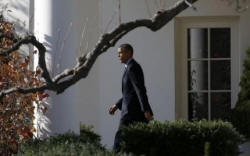|
 White
House has not yet decided on Russia sanctions bill White
House has not yet decided on Russia sanctions bill
 Send a link to a friend
Send a link to a friend
[December 16, 2014]
By Patricia Zengerle
WASHINGTON (Reuters) - The White House
said on Monday that President Barack Obama had not yet decided how to
respond to a bill authorizing new sanctions against Russia over its
activities in Ukraine, although some lawmakers said they expected he
would sign the measure into law.
|
|
 "This is something that has been the source of some discussions at
the White House over the last several days," spokesman Josh Earnest
told reporters aboard Air Force One. "This is something that has been the source of some discussions at
the White House over the last several days," spokesman Josh Earnest
told reporters aboard Air Force One.
Administration officials said they are deeply concerned about
Russia's actions in Ukraine, but they want any sanctions regime to
minimize the impact on U.S. business, international oil markets and
the global economy.
Obama had said previously he opposed further sanctions on Russia
unless Europe is on board. The administration had also held off
supporting lethal military aid for the Kiev government, which is
also authorized in the bill.
Congress passed the "Ukraine Freedom Support Act" on Saturday,
seeking to put more pressure on President Vladimir Putin by
authorizing new sanctions on weapons companies and investors in its
high-tech oil projects, and to boost the Kiev government with
military aid.
 At the White House's request, the measure authorizes sanctions but
does not make them mandatory, giving Obama leeway over what would
actually be in force.
The measure's Senate sponsors, Republican Bob Corker and Democrat
Robert Menendez, said they hoped Obama would sign the bill. "It
would be a pretty big breach of relations because we worked with the
administration so much," Corker told Reuters.
John Boehner, the Republican speaker of the House, issued a
statement on Monday urging Obama to sign the bill.
The rouble plunged around 10 percent against the dollar on Monday,
its sharpest fall since 1998, and Russian assets sold off across
markets amid concern about possible new sanctions.
[to top of second column] |

The bill authorizes Obama to apply sanctions on state-owned arms
exporter Rosoboronexport and other defense companies that Congress
says contribute to instability in Ukraine, Georgia and Syria.
Penalties go beyond U.S. and EU sanctions imposed in September on
the world's largest oil companies such as Exxon Mobil Corp and BP
Plc.
The legislation would also allow $350 million in lethal and
non-lethal military assistance to Ukraine from 2015 to 2017 and
other aid for energy to the country, which has been threatened by
cutoffs in natural gas supplies from Russia.
(Reporting by Patricia Zengerle, Jeff Mason, Steve Holland and
Timothy Gardner; Editing by Mohammad Zargham and Cynthia Osterman)
[© 2014 Thomson Reuters. All rights
reserved.] Copyright 2014 Reuters. All rights reserved. This material may not be published,
broadcast, rewritten or redistributed.
 |